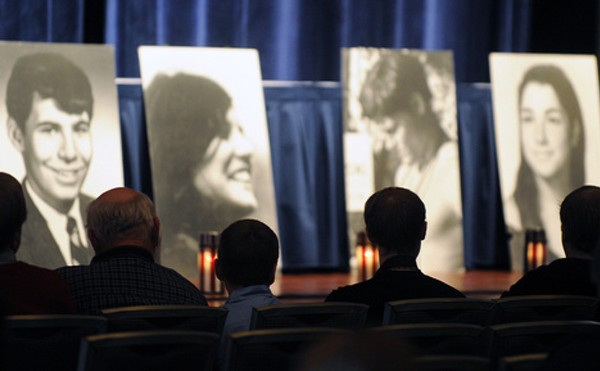So the only Grimes-McConnell Senate debate was last night, and the only thing more frustrating than watching that circus is attempting to concoct an interesting analysis worth reading. Here’s my analysis: It wasn’t for you. That statement is accurate for 90 percent of voters, which means even fewer KET viewers. Fewer than 10 percent of voters have not made up their mind for whom they will vote in three weeks, and they are the least engaged, least educated and most independent by statistical definition.
Basically, if you were looking for a palatable alternative to Mitch, Alison proved she can handle the stage. If you are one of the 37 percent of Kentuckians who still approve of McConnell’s job performance after 30 years, you were never voting for Alison anyway.
Next week is LEO’s Election Issue, so there will be plenty of time to beat that dead horse.
There is a brilliant, satirical, borderline irreverent musical called “Avenue Q” — essentially an R-rated “Sesame Street.” One of the the more outrageous songs is called, “Everyone’s a Little Bit Racist.” In five and a half minutes, actors sing and dance to a cheerful melody, while completely undressing society’s most uncomfortable stereotypes for whites, blacks, Mexicans, Chinese, Polacks, Jews, taxicab drivers and the spectrum of political correctness.
The song ends with the chorus singing, “Everyone’s a little bit racist, it’s true. But everyone is just about as racist as you! If we all could just admit that we are racist a little bit, and everyone stopped being so PC, maybe we could live in harmony.”
So let us be real with one another. Whenever someone says something to the effect of, “It’s time to have a discussion about this,” they are inadvertently admitting to the their own blindness to the racism — or bias regarding that issue — that has always existed and merely changed forms, or means of attack. I am sure that I have been guilty of this.
Recently, I was leafing through old LEOs and stumbled across one of the more remarkable commentaries on race I have ever heard: “No one cared a hoot about whether college athletes graduated until blacks began to dominate basketball and football.” This is the type of racism identification that must be called out.
In the last week, two of the most elite college football players in the country have come under scrutiny for possibly receiving money for autographing items — Todd Gurley, running back for Georgia, and Jameis Winston, quarterback for Florida State and reigning Heisman Trophy winner. This would not have happened if either of these players was white.
Yes, I know that white All-American Johnny “Football” Manziel was suspended for a half of a game last year because of a potentially similar violation. And yes, some will believe I am overstating the significance of only two stories. However, Manziel was witnessed signing memorabilia by several people, including officials from his school, Texas A&M. His brazen disregard for possible impropriety forced others to report the infraction. Gurley was outed by a white memorabilia broker when he apparently agreed to sign items for other brokers, diminishing the value of the other items.
Essentially, when a black athlete was of lesser value to the white person for whom he was working, he was turned into a criminal, while the white guy kept his profits.
Gurley potentially broke NCAA rules. I am not here to defend Gurley or Winston. However, we have a troubling tendency in society to blame the victim. In this case, the powers-that-be, from the NCAA to the media, continue to punish the wrong criminal.
I am 30 years old. I learned about the Civil Rights movement through textbooks and black-and-white videos. Growing up, Martin Luther King seemed as old as Lincoln, who seemed as old as Washington, who seemed as old as Columbus — it was all ancient history.
What the textbooks did not tell me, nor did school teach me, is that progress is only temporary. Racism never disappears, and “everyone is a little bit racist.”
If we cannot laugh at ourselves and each other, or exchange political correctness for honesty, we will never realize affliction that handicaps us.





